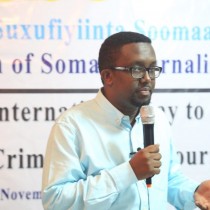
Somalia ends 2016 with gloomy record of repression against journalists, says NUSOJ
Three broadcast journalists were murdered in the year, half as many as last year. But nearly 50 journalists have been arrested as the government cracked down on critical reporting, the NUSOJ said in its annual review.
"The sad chronicle of abominable attacks on press freedom in Somalia documented by the union in 2016 clearly shows how successful with those with power in undermining freedom of expression in Somalia, promoting attempts to control over even the independent media and giving repressive elements tools of intimidation or even at worst to eliminate journalists” said Omar Faruk Osman, NUSOJ Secretary General.
"We call on Somalia’s federal and regional authorities to stop persecuting and pressuring journalists, rather to protect and support journalists in their mission to inform the public and the world,” added Osman.
Killings of Journalists
Among the dead, female journalist Sagal Salad Osman of Somali National TV was shot by gunmen on 5 June, while Abdiasis Mohamed Ali (Haji) of Radio Shabelle was murdered on 27 September in Mogadishu. Mahad Ali Mohamed of Voice of Mudug Radio succumbed to wounds he sustained from a stray bullet that hit him in Galkayo on 6 November.
No one was arrested or even questioned for the killers, NUSOJ said.
Intimidations and Arrests
Forty-seven journalists were arrested during 2016, nearly double the year before. Some were charged while others were released without charges. The arrests took place in Mogadishu, Kismayo, Dhusamareb, Beledweyne, Adado, Galkayo, Bossasso, Jowhar, Garowe, Hargeisa, Berbera, Borame and Sanaag.
The Federal Government as well as authorities of Puntland, Somaliland, Jubaland, Galmudug, the Hiran regional administration and armed group Ahlu-Sunah Waljama were responsible for these arrests.
The number of arrests increased 47% in this year in comparison to 2015. Journalists also received countless threats personally or through telephone calls, NUSOJ said.
There has also been a sharp increase in attacks against the independent media, both verbal and physical. Eight media houses were attacked in 2016, in retaliation for reports broadcast or published by the media house.
Media Law
The Federal Government’s a new media law, which took effect in January 2016 has been criticised as contravening Somalia’s international obligation to freedom of expression.
It requires journalists to have university degree in journalism in order to recognise them as a journalist. It forces journalists to disclose confidential sources if ordered by a court. It imposes unaffordable fines on journalists and empowers the Ministry of Information to have a role in setting ethical standards that journalists must follow.
These legal provisions will, cumulatively, result in a high degree of control on the part of the government over the flow of information and a corresponding shrinking of the space for freedom of expression in Somalia, NUSOJ said.
The situation of press freedom in Somalia is exacerbated by the excessive use of power through illegal means by the Federal Government and regional administrations, NUSOJ said. "Political leaders and public officials are not held accountable for arrests, intimidations and threats against media houses, thus promoting a culture of impunity as opposed to a culture respectful of the rule of law” declared Osman.
After flaunting their contempt for human rights of journalists, government officials escape accountability for their actions even after they leave power due lack of political will for political leaders to hold them to account, thus creating a precedent of impunity for future attacks against journalists and media houses, NUSOJ said.
Leave a comment
| Copyright © 2009 - 2025 Sunatimes News Agency All Rights Reserved. |
| Home | About Us | Diinta | Reports | Latest News | Featured Items | Articles | Suna Radio | Suna TV | Contact Us |
 0
0 









Somalia ends 2016 with gloomy record of repression against journalists, says NUSOJ
Deadly attacks on reporters and their news outlets as well as a government campaign of repression under a new media law marked 2016 in Somalia, reinforcing a dangerous climate of impunity toward the news media, says the National Union of Somali Journ